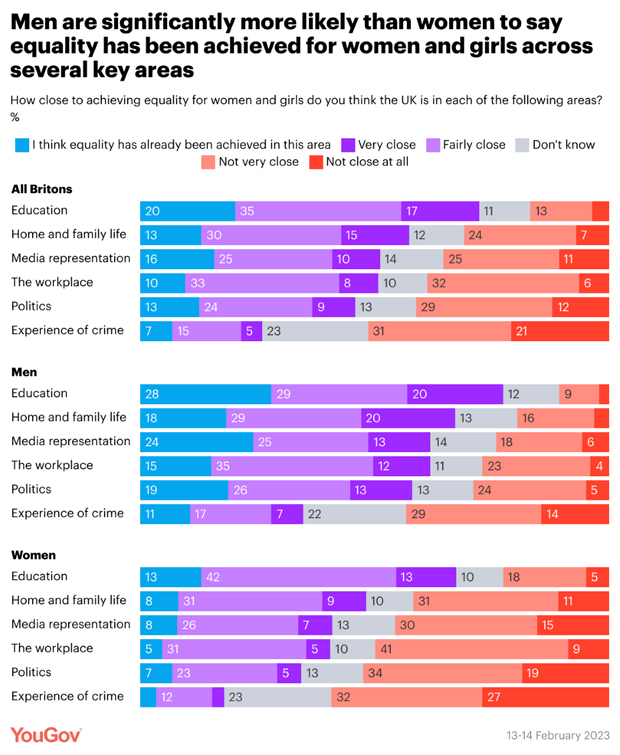The large majority of the public maintain equality for women and girls has not yet been achieved across several key areas, from home and family life to work, education, media representation, crime and politics.
This is according to the findings of a new YouGov poll, which revealed that education is where the largest proportion of Britons believe equality has already been won, but even then, just two in 10 (20 per cent) say so.
Half of the respondents (52 per cent) say the UK is “very” or “fairly” close to achieving equality in education, but 17 per cent say it is not yet close to being achieved.
One in 10 Britons (10 per cent) think there’s equality for women and girls in the workplace, while 41 per cent say the country is close to achieving equality and 38 per cent say it’s not close.
The area where work is most needed, according to most Britons, is around crime.
Just a minority (7 per cent) of the public say women and girls’ experience of crime is on a par with men’s, while half (52 per cent) say equality in this area is not close to being achieved. Twenty per cent however, believe equality is close.
Across every measure asked, men are notably more likely than women to suggest equality for women and girls has already been achieved.
The most significant gender gaps are around media representation (24 per cent of men believe equality is achieved compared to 8 per cent of women), education (28 per cent to 13 per cent) and politics (19 per cent to 7 per cent).
Feminism in the UK
The efforts of feminists are still needed in the UK, according to half of Britons (50 per cent), including 20 per cent who say there’s a great deal of need for feminism in the UK at the moment.
However, three in 10 Britons believe there’s not very much need (22 per cent) or no need at all (8 per cent) for feminism in this country.
At 59 per cent to 41 per cent, women are more likely than men to believe feminism is still needed, with young women most likely to say so – 69 per cent of 18 to 29-year-old women say feminism is needed, compared to 47 per cent of women aged 65 and over.
Those who are 65 and older are generally least likely to think the UK needs feminism, with just 32 per cent of men in that age group saying so compared to between 42 per cent and 45 per cent of men of other ages.
8th March, 11am – 12pm
FMJ is teaming up with Alcumus, leaders in supply chain compliance, and their client Sodexo, world leader in catering and facilities management, to explore how FM professionals can deliver unique value to existing and prospective clients by creating a diverse and inclusive supply chain to help drive resilience and compliance.
According to research, 92 per cent of consumers are more likely to trust a company that supports social or environmental issues while 58 per cent of employees consider a company’s social and environmental commitments when deciding where to work.
The panel will explore how Alcumus and Sodexo are working in partnership to deliver supplier chain compliance for Sodexo, and why they are both so passionate about promoting diversity and inclusion beyond the workplace and into the supply chain.
The webinar will also discuss:
- Why supply chain compliance is influencing FM provider selection
- Why supplier diversity is so important in FM
- How to identify and mitigate risk in your supply chain
- How to ensure diversity and inclusion in your supply chain
Click here to register for this free event.






